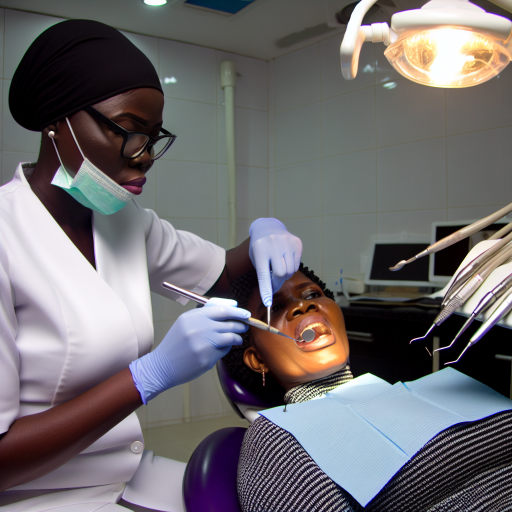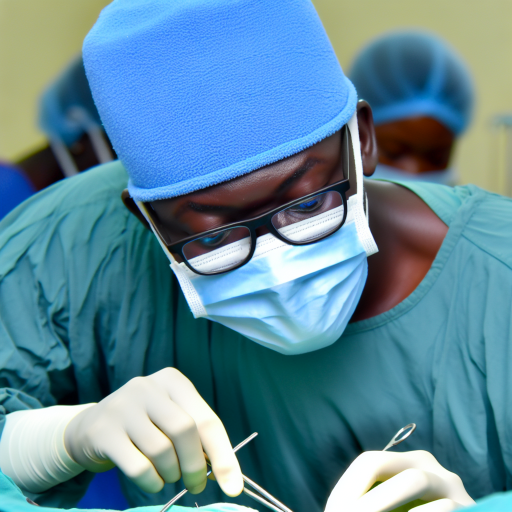Introduction:
Diabetic Retinopathy: is a complication of diabetes that affects the eyes.
Prevalence in Nigeria: It is a significant issue with a high number of cases.
Importance of Early Detection: Early detection and treatment are crucial to prevent blindness.
Causes and Risk Factors of Diabetic Retinopathy:
Diabetic retinopathy is a serious complication of diabetes that affects the eyes.
Understanding the causes and risk factors of this condition is essential in managing and preventing vision loss in diabetic patients.
One of the primary causes of diabetic retinopathy is the damage that high levels of blood sugar inflict on the tiny blood vessels in the retina.
When blood sugar levels are consistently elevated, these vessels become weak and leaky.
This leads to swelling and potential blockages.
As a result, the retina, which is responsible for capturing images and sending signals to the brain, is unable to function properly.
This causes vision problems.
In addition to uncontrolled blood sugar levels, several risk factors can increase the likelihood of developing diabetic retinopathy.
Poor blood sugar control over an extended period accelerates the progression of retinopathy.
This makes it crucial for diabetics to monitor and manage their glucose levels diligently.
High blood pressure is another significant risk factor for diabetic retinopathy.
Hypertension can exacerbate the damage to blood vessels in the retina, further compromising vision.
Maintaining optimal blood pressure levels is essential for preventing or slowing the progression of retinopathy in diabetic patients.
Genetics also play a role in the development of diabetic retinopathy.
Some individuals may be genetically predisposed to the condition, making them more susceptible to retinal damage.
Understanding one’s family history and genetic predisposition can aid healthcare providers in tailoring treatment plans.
Regular eye exams are paramount for diabetics to detect diabetic retinopathy in its early stages.
Comprehensive eye screenings can identify subtle changes in the retina before symptoms manifest.
This allows for timely intervention and management.
Diabetics should prioritize annual eye exams to monitor their eye health and prevent vision loss.
Current Challenges in Diagnosing and Treating Diabetic Retinopathy in Nigeria:
- Address lack of awareness among diabetic patients
- Discuss limited resources for eye care in the country
- Explore barriers to accessing specialized treatment for diabetic retinopathy
Addressing Lack of Awareness Among Diabetic Patients:
One of the major challenges in Nigeria is the lack of awareness among diabetic patients regarding diabetic retinopathy.
Many individuals with diabetes are not aware of the potential risks to their vision, which leads to delayed diagnosis and treatment.
In order to combat this issue, educational campaigns and outreach programs are essential.
Healthcare providers must prioritize raising awareness about the importance of regular eye exams for diabetic patients to prevent vision loss.
Discussing Limited Resources for Eye Care in the Country:
Nigeria faces a significant shortage of resources for eye care, including trained ophthalmologists, equipment, and facilities.
This scarcity makes it difficult for diabetic patients to access the necessary eye exams and treatments for diabetic retinopathy.
Government and private sector investments are urgently needed to improve the infrastructure for eye care services across the country.
By expanding resources and building capacity in eye care, Nigeria can better serve the growing population of diabetic individuals at risk of vision loss.
Exploring Barriers to Accessing Specialized Treatment for Diabetic Retinopathy:
Accessing specialized treatment for diabetic retinopathy remains a challenge for many Nigerians, particularly those living in rural and underserved communities.
Limited access to specialized eye care facilities, long wait times, and high costs are significant barriers for patients seeking treatment.
To overcome these obstacles, it is crucial to establish more eye care centers in underserved areas, improve transportation networks for patients, and implement cost-effective treatment options.
By addressing these barriers, more individuals can receive timely and appropriate care for diabetic retinopathy, ultimately reducing the burden of vision impairment in Nigeria.
Discover More: Biomedical Technology Career Paths and Salaries Nigeria
Efforts of Nigerian Doctors in Combating Diabetic Retinopathy
Advocacy Campaigns for Diabetes Awareness
Nigerian doctors have been actively involved in conducting advocacy campaigns to raise awareness about diabetes, its risk factors, and the importance of regular eye screenings to detect diabetic retinopathy early.
These campaigns aim to educate the general public and empower individuals to take control of their health by adopting healthy lifestyles and seeking appropriate medical care.
Through these advocacy efforts, doctors emphasize the link between diabetes and eye complications, including diabetic retinopathy, which can lead to irreversible vision loss if left untreated.
By spreading awareness about the significance of early detection and management, doctors hope to reduce the prevalence of diabetic retinopathy in Nigeria.
Transform Your Career with Expert Guidance
Get personalized mentorship consulting that’s tailored to your unique path. Our expert advice is actionable and exclusive.
Get StartedInitiatives to Improve Access to Eye Care Services
In addition to awareness campaigns, Nigerian doctors have implemented various initiatives to improve access to eye care services for individuals at risk of or already diagnosed with diabetic retinopathy.
These initiatives include setting up mobile eye clinics in underserved communities, conducting screening programs at public health facilities, and partnering with local organizations to provide affordable eye care services.
By bringing eye care services closer to individuals in need, doctors aim to ensure timely detection and treatment of diabetic retinopathy, ultimately reducing the burden of preventable blindness in Nigeria.
Furthermore, doctors have been working to enhance the capacity of primary health care providers through training programs on diabetic retinopathy management.
By equipping healthcare workers with the knowledge and skills to deliver quality eye care services, doctors strive to improve the early detection and appropriate treatment of diabetic retinopathy at the community level.
Collaborations with International Organizations to Enhance Treatment Options
Nigerian doctors have forged partnerships with international organizations and institutions to enhance the treatment options available for individuals with diabetic retinopathy.
These collaborations have facilitated the exchange of knowledge, expertise, and resources to improve the quality of care provided to patients in Nigeria.
Through collaboration with international experts, doctors have access to advanced treatment modalities, such as laser therapy, intravitreal injections, and vitrectomy.
These are essential for managing severe cases of diabetic retinopathy.
By incorporating these treatment options into their practice, doctors can offer comprehensive care to individuals with advanced stages of the disease, thereby improving visual outcomes and quality of life for patients.
Nigerian doctors have demonstrated a strong commitment to combating diabetic retinopathy through their advocacy efforts, initiatives to improve access to eye care services, and collaborations with international organizations.
By working tirelessly to raise awareness, enhance access to care, and expand treatment options, doctors are making significant strides in addressing the challenges posed by diabetic retinopathy in Nigeria.
Explore Further: Telemedicine in Ophthalmology: Nigerian Innovations
Innovations in Diabetic Retinopathy Management in Nigeria:
- Advancements in telemedicine for remote diagnosis
- Exploring the use of artificial intelligence for early detection
- Promising research on new treatment modalities
Telemedicine has revolutionized healthcare delivery in Nigeria.
Particularly in the management of diabetic retinopathy.
With the shortage of specialists in remote areas, telemedicine provides a way for patients to receive timely diagnosis and treatment.
The use of artificial intelligence (AI) in diabetic retinopathy screening has shown great promise.
It improves early detection rates.
AI algorithms can analyze retinal images quickly and accurately.
They identify signs of retinopathy that might be missed by the human eye.
Ongoing research in Nigeria focuses on developing new treatment modalities for diabetic retinopathy.
This includes studies on novel medications, surgical techniques, and regenerative therapies.
These advancements could potentially reverse or halt the progression of the disease.
Such innovations are crucial in addressing the growing burden of diabetic retinopathy in Nigeria.
The prevalence of diabetes is on the rise.
By leveraging technology and cutting-edge research, Nigerian doctors are at the forefront of combating this sight-threatening complication of diabetes.
Delve into the Subject: Importance of Veterinary Medicine in Nigerian Society

Success Stories of Diabetic Retinopathy Treatment in Nigeria:
Share patient testimonials on successful outcomes
Patient testimonials play a crucial role in showcasing the effectiveness of diabetic retinopathy treatment in Nigeria.
These stories serve as powerful evidence of the positive impact that proactive management strategies can have on preserving vision.
Hearing firsthand accounts from individuals who have successfully undergone treatment for diabetic retinopathy can provide hope and encouragement to others facing similar challenges.
By sharing these testimonials, Nigerian doctors can not only celebrate the victories of their patients but also inspire others to seek early intervention for optimal outcomes.
Highlight case studies of effective management strategies
In addition to patient testimonials, highlighting case studies of successful management strategies can further demonstrate the effectiveness of diabetic retinopathy treatment in Nigeria.
These real-life examples showcase the various approaches that doctors have taken to address the condition and provide insight into the positive results that can be achieved through tailored treatment plans.
By delving into specific cases and detailing the interventions that led to successful outcomes, healthcare professionals can offer valuable information to both patients and colleagues.
This helps to improve overall awareness and understanding of diabetic retinopathy management.
Emphasize the importance of early intervention in preserving vision
One of the key takeaways from success stories and case studies of diabetic retinopathy treatment in Nigeria is the critical importance of early intervention.
By emphasizing the value of timely diagnosis and proactive management, healthcare providers can underscore the impact that early treatment can have on preserving vision and preventing complications.
Educating patients about the benefits of early intervention and encouraging them to seek regular screenings can help to reduce the risk of vision loss.
This can improve overall outcomes for individuals with diabetic retinopathy.
Ultimately, these success stories serve as a powerful reminder of the positive changes that can occur when patients and healthcare professionals work together to address this potentially blinding condition.
Explore Further: Top Ophthalmology Clinics in Nigeria: Where to Find the Best Care
Nigerian Doctors Combat Diabetic Retinopathy
Nigerian doctors are actively fighting diabetic retinopathy, a leading cause of blindness in diabetic patients.
They are using advanced diagnostic tools and treatment methods to combat this disease and prevent vision loss.
It is crucial for diabetic patients to prioritize their eye health by attending regular eye check-ups and following their doctor’s recommendations.
By raising awareness about diabetic retinopathy and educating patients about the importance of eye care, Nigerian doctors are making a significant impact.
For further information and support on diabetic retinopathy, individuals can reach out to the Nigerian Medical Association or visit reputable medical websites for accurate and updated resources.




